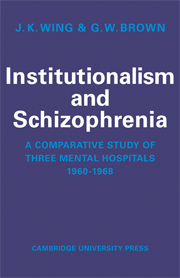Book contents
- Frontmatter
- Contents
- List of tables and figures
- Preface
- Acknowledgements
- 1 Disease and the social environment
- 2 The design of the study and methods of measurement
- 3 The three mental hospitals
- 4 The nature of institutionalism in mental hospitals
- 5 Differences between the hospitals in 1960
- 6 Changes in patients and environment, 1960–1964
- 7 Changes in the three hospitals compared, 1960–1968
- 8 The numerical data illustrated by a descriptive account of selected wards and representative patients
- 9 Comparative survey of schizophrenic patients in an American county hospital, 1964
- 10 Institutionalism and schizophrenia: summary, discussion and conclusions
- Tables and figures
- References
- Index
9 - Comparative survey of schizophrenic patients in an American county hospital, 1964
Published online by Cambridge University Press: 04 August 2010
- Frontmatter
- Contents
- List of tables and figures
- Preface
- Acknowledgements
- 1 Disease and the social environment
- 2 The design of the study and methods of measurement
- 3 The three mental hospitals
- 4 The nature of institutionalism in mental hospitals
- 5 Differences between the hospitals in 1960
- 6 Changes in patients and environment, 1960–1964
- 7 Changes in the three hospitals compared, 1960–1968
- 8 The numerical data illustrated by a descriptive account of selected wards and representative patients
- 9 Comparative survey of schizophrenic patients in an American county hospital, 1964
- 10 Institutionalism and schizophrenia: summary, discussion and conclusions
- Tables and figures
- References
- Index
Summary
In February 1964 one of the authors was invited by Professor Martin Loeb to spend a few days in Madison, Wisconsin, as a consultant to the County Mental Hospital Project.
The Wisconsin public hospital services differ from those available in other states in the U.S.A. in that a substantial proportion of patients who need long-term care live in small county institutions rather than large state hospitals. Intensive treatment facilities are not available and patients who require these are transferred back to the state hospital. Thirty-six of the 71 Wisconsin counties are served by such institutions, ranging in size from 40 to 380 beds in 1961. Nearly half the patients had been in hospital for more than ten years.
The hospital chosen for the present study was Columbia County Hospital, Wyocena. There were 110 male and 215 female patients on 1 July 1960, 22 per cent of them classified as mentally subnormal, the rest as mentally ill. Thirty-six per cent of patients had a diagnosis of schizophrenia. Three-quarters had been transferred from a state institution and 19 per cent were direct admissions. Forty per cent had been resident for ten years or more. All patients were committed, as there was no form of voluntary or non-statutary admission.
The superintendent and matron were a married couple with no professional training. The attendants had no qualification in psychiatric nursing but there was a part-time social worker.
- Type
- Chapter
- Information
- Institutionalism and SchizophreniaA Comparative Study of Three Mental Hospitals 1960-1968, pp. 166 - 176Publisher: Cambridge University PressPrint publication year: 1970



